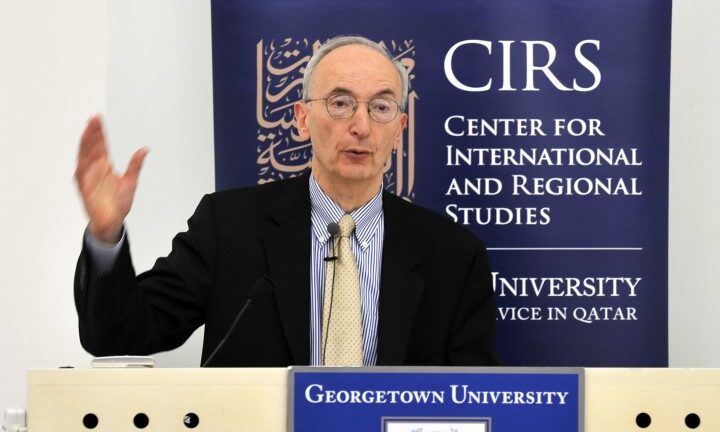American Studies, Dialogue Series, Regional Studies
Robert Lieber on Why the Declinists Are Wrong About America

Robert Lieber, Professor of Government and International Affairs at Georgetown University in Washington, DC, delivered the January CIRS Monthly Dialogue on the topic of “Why the Declinists are Wrong About America.”
Lieber examined the recurring nature of comments regarding America’s decline, both at home and abroad, and argued that critics have been predicting the fall of the United States for decades. The current financial crisis and its impact on American economic and geopolitical power has again stoked these criticisms, but, he said, the United States has been through far worse in its history, and has managed to overcome even greater obstacles.
Reviewing the history of the various setbacks that the United States has experienced, Lieber noted that “declinists’ proclamations about America have appeared ever since America’s founding.” Further down the line, in the 1930s, America experienced its worst financial crisis and a total economic collapse. During these years, a quarter of the American work-force was unemployed and there was a significant drop in the GNP. This, he said, was a profound crisis that prompted many public intellectuals to wonder whether the “liberal democratic model” could survive.
The power of the United States as a world leader was again questioned in the 1950s after the Soviets successfully launched the Sputnik satellite, “which was the first man-made object in the history of humanity to leave Earth’s orbit.” This act showed that the Soviets had mastered rocket propulsion and “had the capacity to launch intercontinental ballistic missiles,” triggering a concern that America had become stagnant and was falling behind in terms of scientific prowess.
Similarly, the leadership of the United States was condemned in the 1970s after the withdrawal from Vietnam, the Soviet incursion into Afghanistan, and the seizure of the U.S. embassy in Tehran. In the 1980s and 1990s, the United States was often compared, unfalteringly, to Japan, which was revered internationally as a model of economic development and success. Lieber argued that “it can be instructive to compare current arguments and prescriptions of the new declinism with the ideas of earlier eras.” Current declinist statements, Lieber explained, are the product of exaggerated and ahistorical claims. In particular, they reveal “a lack of appreciation for the robustness and staying-power of the United States.”
Examining current declinist pronouncements, Lieber argued that there are two propositions that are widely asserted. The first is that the United States, as a society, in terms of its economics, political power, and its ethos, is in decline domestically. The second proclamation is that due to globalization in the context of a multi-polar world, a counterbalancing of power is taking place and America’s world role has diminished and it is becoming “one among equals.”
During the Bush administration, and in the aftermath of the war in Iraq, the United States was regarded as having lost not only its hegemony, but also its legitimacy. The enfeeblement of the United States has been attributed to “military overstretch,” and its involvement in two costly wars in Iraq and Afghanistan. Lieber responded to these criticisms regarding exorbitant military costs by arguing that “the total cost of the American defense budget today is somewhere around 4.5% of Gross Domestic Product – a GDP of 14 trillion dollars. In absolute terms, it is an enormous amount of money,” but, he said, “in relative terms, by historical standards, it is modest.”
The current challenges that the United States faces, Leiber explained, include an aging population, which will put enormous pressures on the infrastructure of the country, especially in relation to the healthcare system and social security; a continued dependence on imported oil; political polarization; deficits in the annual budget; huge national debt; as well as the future problems that will be faced in relation to the rise of China.
Lieber concluded by arguing that “America’s problems are real, and it would be absurd not to recognize those, but I would also add that we’ve always had problems,” and the United States has overcome them by fostering an exceptional environment for entrepreneurialism. “America’s competitiveness, its scientific research infrastructure, its universities, its commitment to competition and free markets, and its efficient capital markets are all important factors.”
In order to assert that declinist proclamations are exaggerated and hyperbolic, Lieber noted that “since the early 1970s, the U.S. has represented somewhere between a quarter and a fifth of world economic activity,” and its economic growth has far outpaced the rest of the world.
During the public Q&A session after the conclusion of the lecture, Leiber was asked whether America’s unilateralism and preemption, which in the Bush era led to a decline of America’s stature around the world, a noticeable rise in anti-Americanism, and an erosion of American soft power globally, suited America’s interests. He responded by asserting that “internationally, the U.S. plays a role that no other country can, or will, do in meeting the world’s most urgent and deadly problems.” The principal problem to avoiding America decline at home and abroad, Lieber said, is less a material one, than it is one of political institutions and political will.
Robert Lieber is an authority on American foreign policy and U.S. relations with the Middle East and Europe, and has held fellowships from the Guggenheim, Rockefeller, and Ford Foundations, the Council on Foreign Relations, and the Woodrow Wilson Center for Scholars. He has also taught at Harvard, Oxford, and the University of California, Davis.
Article by Suzi Mirgani. Suzi is CIRS Publications Coordinator.